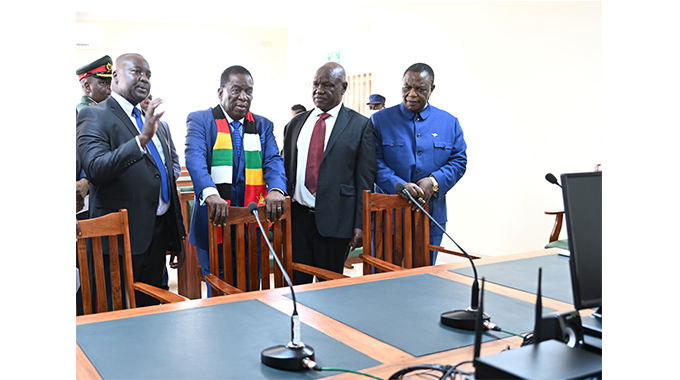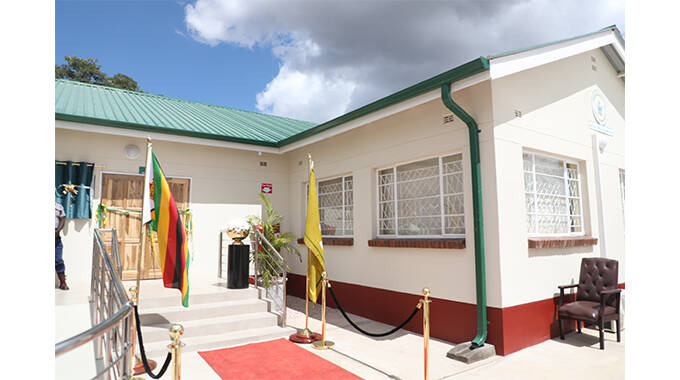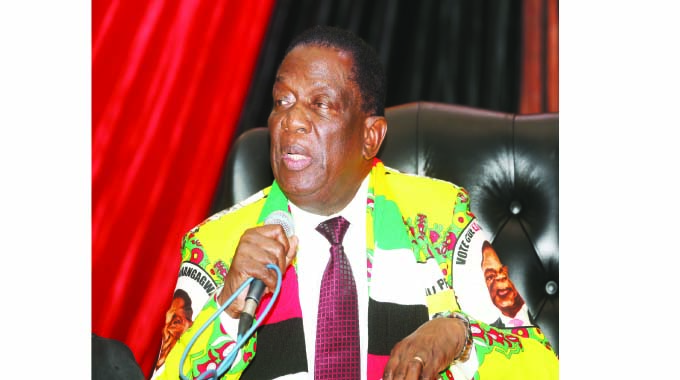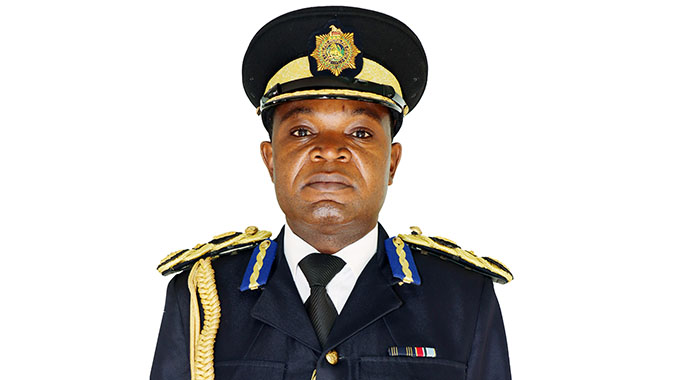‘Foster a corruption-free judicial system’

Rumbidzayi Zinyuke, Harare Bureau
President Mnangagwa has told the magistrates and judges to deal decisively with cases of corruption within the judicial service as well as drug and substance abuse that have destroyed the moral fabric of communities and in the process derailing the Second Republic’s economic development agenda.
He also called on Zimbabweans to promote peace during the upcoming harmonised elections despite their diverging views.
The President made the remarks while officially opening the Epworth Magistrates Court in Harare yesterday.
“Under my administration, the integrity of the judiciary remains key towards deepening constitutionalism, the rule of law and ensuring functional as well as productive communities,” said President Mnangagwa.
“Hence, let us continue to foster a corruption-free, proficient, efficient and effective judicial system, which we are all proud of. I urge judicial officers and legal practitioners, among others, to keep the halls of justice clean by shunning corruption in all its facets.
“Undesirable trends such as increased criminal cases are worrisome and destroying the moral fabric of our communities. We must therefore, at every level, act proactively and decisively to eradicate crime and deviance in all its ugly forms.”
The new Epworth Magistrates Court is another milestone in the Second Republic’s quest to bring justice delivery systems closer to the people in line with the decentralisation and devolution agenda and National Development Strategy 1 (NDS1).
Similar courts are expected to be established in Cowdray Park and Emganwini in Bulawayo, Mkoba in Gweru, Mucheke in Masvingo, Sakubva and Dangamvura in Mutare as well as Glen Norah, Mabvuku and Budirio in Harare.
President Mnangagwa said the establishment of courts in such locations would help fight the temptation by communities to resort to the practice of self-help and mob justice.
“As a united and independent people we are marching forward and building the Zimbabwe we all want; brick by brick, stone upon stone and step by step. The completion of this court serves as a reflection of our commitment to take justice closer to the people.
“This is in keeping with our development mantra which entails implementing development programmes and projects which leave no one and no place behind,” he said.
He commended the JSC for the infrastructure developments as well as the modernisation of courts, which have been equipped with information, communication technology tools.
On the upcoming harmonised elections, President Mnangagwa said it was everyone’s duty to observe peace and called on the courts to deal decisively with those who instigate violence and disorder.

The President officially open the Epworth Magistrates Court in Harare
“I therefore, call upon all our people, including political parties, civil society organisations, religious institutions and the media to always promote peace. Where we differ, violence must not be an answer or strategy.
“We are all Zimbabweans first and foremost, brothers and sisters and we must never inflict violence upon ourselves in the name of diverging views. Let us sustain the prevailing peace, unity, love and harmony, focused on nation building,” he said.
Chief Justice Luke Malaba said the commissioning of the Epworth Magistrates Court was an important step in the JSC’s institutional responsibility to ensure the provision of quality service to the public.
“The Commission’s major concern is the effective enforcement of human rights. To achieve this objective, access to justice, when broadly understood, has to address two major concerns; that is, firstly, guaranteeing the said rights through mediums such as the Constitution, and, concomitantly, ensuring the capacity development of State institutions and citizens to guarantee the protection of those rights.
“State institutions must be strong for them to properly perform their constitutional function of protecting and promoting fundamental human rights.
Therefore, the commissioning of courthouses throughout urban townships in the country, starting with Epworth today, ensures that justice systems are readily available to accommodate people’s needs,” he said.
Justice Malaba said devolution and decentralisation had a vital role in the progression of the nation in all spheres of life, adding that the goal was to put in place modern court structures in the most densely populated townships in urban and rural areas.
“All of us here look forward to seeing cases brought to the court being heard and disposed of without unreasonable delay.
“Unreasonable delays in the finalisation of cases by courts create in the minds of people an impression of an inefficient and ineffective system.
Courts have and must, where appropriate, use the power to put an end to continued attempts to defeat the course of justice through requests for postponements of cases for purposes of delaying their finalisation,” he added.
The Epworth Magistrates Court heard its first case at 2.30pm yesterday, with resident magistrate Ms Tafadzwa Miti presiding.
The appointment of Ms Miti as resident magistrate is in line with the Second Republic’s vision of creating equal opportunities for both men and women across all sectors.

Epworth Magistrates Court
Speaking after the commissioning of the court, Ms Miti said she was ready to serve the people and bring justice closer to them.
“We are excited at the commissioning of this new court in Epworth.
It is a great milestone for the JSC and the justice delivery system, which means justice has come to the people,” she said.
Ms Miti said the court would deal with all criminal and civil court matters such as domestic violence, maintenance matters and others within their jurisdiction.
“As we are still in the Women’s Month, it is an honour as a woman to be appointed to this office. I have been empowered to be leading on the bench, I am happy and ready to do this work.
“To other women out there, I want to encourage them to be bold and brave. It is possible for women to sit in such offices to administer justice. It is possible to be a leader as a woman so they should work hard and be consistent in their work,” she said.
Epworth residents expressed gratitude at having the court closer to them.

His Excellency open Epworth court
Mr Lovemore Maridzanyere said most criminal cases had gone unreported in the past while those who had to attend court would fail to do that owing to the distance they had to travel to Rotten Row Magistrate’s Court.
“Not everyone could afford to travel to town and as such some people failed to attend court,” he said.
Ms Loyce Mushangidze, a counsellor by training, said she had been working with some youths who abuse drugs.
“The menace of drug abuse is rampant here and it is a sorry situation when you see a base at every corner.
“We hope the coming of the court here will help us in making sure that these people are arrested and go to trial. Many people will report some of these cases if they know the courts are nearby and will take action,” she said










Comments